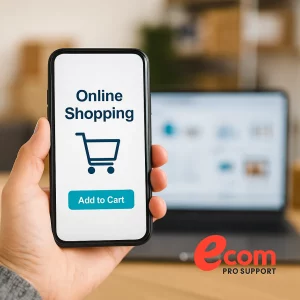Does Ecommerce Make Good Money?

Can You Really Make Money with Ecommerce?
Yes, ecommerce can be a profitable business if approached strategically.
Many entrepreneurs build successful online businesses using platforms like Shopify, Amazon FBA, and WooCommerce. Whether you’re selling physical products, digital downloads, or dropshipping, the key lies in niche selection, product-market fit, pricing strategy, and effective marketing.
How Much Money Can You Make Doing Ecommerce?
Ecommerce earnings vary widely—from side income to full-scale profits.
Some small stores earn £500–£2,000 per month, while successful brands can generate six or seven figures annually. Your earnings depend on:
- Product demand and margins
- Conversion rates and traffic volume
- Operating costs and fulfillment
- Brand reputation and repeat customers
With the right strategy, a beginner can scale to £10K/month within 12–18 months
According to Statista, global ecommerce sales are projected to exceed $8 trillion by 2027, indicating massive earning potential.
Does E-commerce Pay Well?
Yes, especially when it’s treated as a long-term business.
Compared to traditional retail, ecommerce reduces overhead (no physical store needed), offers global reach, and runs 24/7. Once systems are automated (e.g., using fulfillment services, email marketing, or chatbots), profit margins can be significant—ranging from 20% to 50%+ depending on the model.
What Ecommerce Makes the Most Money?
Private label brands and niche-focused stores tend to make the most.
Here are top-performing ecommerce models:
| Ecommerce Model | Profitability | Example Niches |
| Amazon FBA (Private Label) | High | Fitness gear, skincare, pet accessories |
| Dropshipping | Medium (scalable) | Gadgets, fashion, home decor |
| Print-on-demand | Medium | Apparel, art, novelty gifts |
| Digital products | High (low overhead) | E-books, courses, templates |
| Subscription boxes | High (recurring) | Beauty, wellness, snacks |
Explore more: Our FBA support case study with YETI
How Much Do You Need to Start Ecommerce?
You can start with as little as £500–£2,000 depending on the model.
Breakdown for common models:
- Dropshipping: ~£500 (website, ads, apps)
- Amazon FBA (Private Label): £1,500–£5,000+ (inventory, branding, PPC)
- Print-on-demand: ~£300 (designs, store setup)
- Digital Products: <£200 (platform fees, content creation)
Budgeting for product validation, marketing, and optimization is essential.
Need help budgeting your ecommerce business? Let’s talk.
Is Ecommerce Worth It in 2025?
Absolutely—especially as more consumers shop online.
In 2025, ecommerce is more accessible and lucrative than ever. Key trends making ecommerce worth it this year:
- Growth in mobile commerce and voice search
- Better access to global fulfillment networks
- AI-driven personalization and customer service
- Expansion of social commerce (selling on TikTok, Instagram)
- Strong demand for niche, high-quality, sustainable products
If you’re willing to invest time in learning and testing, ecommerce can be a highly rewarding business model in 2025.
Forbes highlights that AI and personalization are driving record ecommerce conversions in 202
Conclusion: Is Ecommerce Still a Good Way to Make Money?
Ecommerce is still one of the best ways to generate income online in 2025.
While competition exists, opportunities continue to expand across platforms, regions, and niches. With the right tools, research, and persistence, you can turn ecommerce into a sustainable income stream—or even a full-time business.
Need help launching your eCommerce journey?
At Ecom Pro Support Ltd, we help beginners and professionals launch or grow their tech careers with mentorship, hands-on projects, and career guidance.
Let’s Talk – Free Discovery Session
About the Author
Muhammad Hamid Nazir
Co-Founder & CTO, Ecom Pro Support Ltd
With over a decade of experience in business intelligence, data automation, and cloud solutions, Hamid helps brands and agencies unlock powerful insights through customized dashboards and real-time analytics tools.



